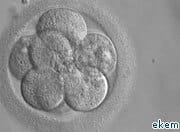Regulations for controversial techniques to create three and four-parent babies have been published.
MPs and Peers will vote early in the new year on allowing the two procedures, Maternal Spindle Transfer (MST) and Pro-Nuclear Transfer (PNT).
MST involves replacing the nucleus in a healthy donor egg with the nuclear DNA from the prospective mother – resulting in a child with DNA from three parents.
No information
PNT creates a child from four different individuals (a chromosomal mother, a chromosomal father, an egg mother and a sperm father).
The regulations, applying to the whole of the UK, say that the woman donating her egg would not be related to the resulting child, and that any child born would have no right to information about the donor.
But Philippa Taylor, of the Christian Medical Fellowship, said that a child “must have the right to identify and know who his or her three genetic parents are, if they choose”.
Identity
“This is already granted to children who are adopted because we understand how important it is for children to know about their genetic heritage for their sense of identity and self-understanding.
“It should not be denied to these children”, she added.
And Dr David King, Director of Human Genetics Alert, raised concerns about the techniques: “This is high-tech medicine at its worst and most unnecessary”.
Public opposition
“Medical researchers are crossing the crucial ethical line that will open the door to designer babies based on scientific misinformation and ignoring majority public opposition”, he added.
The Human Fertilisation and Embryology (Mitochondrial Donation) Regulations 2015 could come into force in October next year if Parliament approves them.
If legalised, the UK would become the only country in the world to permit the two techniques.
Serious debate
The UK Government has previously endorsed the procedures, despite the majority of the public opposing the move.
The New Scientist magazine recently changed its stance on three-parent babies, warning that the UK needs to have a “serious debate” about the ethics and safety of three-parent babies.
The magazine previously dismissed ethical concerns, but said now it appears “we may have seriously underestimated the influence that mitochondria have”.

